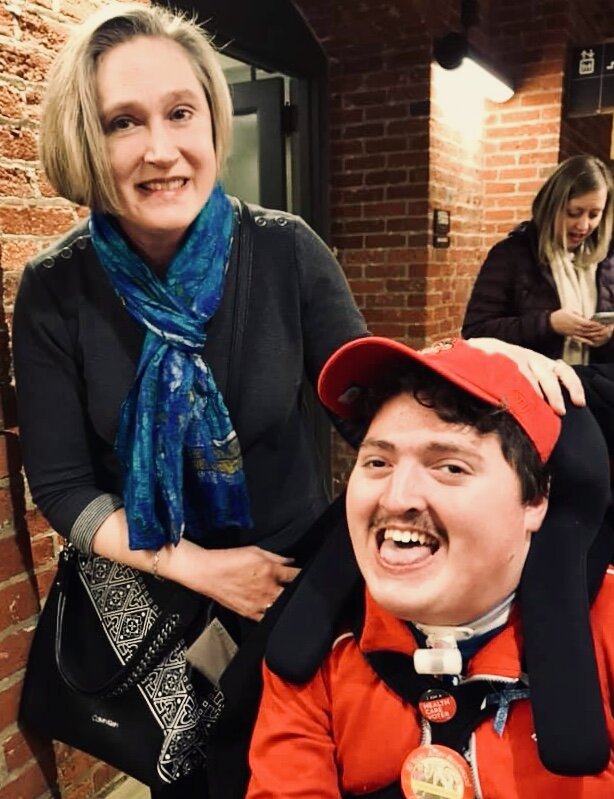Liz Randolph attends Monroe Community College where she is completing her associate’s degree in Health Studies. Her goal is to become a nurse practitioner. She is a member of the Phi Theta Kappa Honor Society and the Co-President of the Holocaust, Genocide, and Human Rights Project at Monroe Community College. Her passions include science, working with children, and advocacy. She lives in Rochester, New York.
Tell me about yourself.
When I become a nurse practitioner, I would love to help ease the transition between pediatric and adult care, as that has been nothing short of a nightmare for me. Furthermore, the psychosocial needs of young adults are not being met in either setting, pediatrics or adult care, currently. Our healthcare system is in desperate need of help.
Before deciding on an NP practice, I wanted to become a child life specialist. I am a firm believer in family-centered care, but I quickly realized that I would not be content without being hands-on with medical care-plus, I love science!
I have an amazing family who is always there for me, and a great group of friends. I am so thankful for my support network and do not know where I would be without them.
Tell me about your medical needs and disabilities.
I have dealt with medical issues my whole life. I have mitochondrial disease and Ehlers-Danlos Syndrome; these have caused a slew of issues from hypotonia (low muscle tone) to motility disorders (digestive issues). I had my feeding tube placed when I was eighteen months old, and I am now twenty-one. I also now have a broviac (central line), and a cecostomy tube, which aids the function of my digestive tract.
What’s the upside of tube feeding?
The biggest upside to tube feeding is my life. I would not be here today without my feeding tube. Everything that I do is because of my feeding tube, not in spite of it. It has enabled me to be fed, nourished, and to have the energy to accomplish the things that I want to do. My feeding tube is not the enemy. Constantly striving to get rid of it is unrealistic at this point; instead, I want to accept where I am today and celebrate the very thing that has given me life.
Have you faced any bias as a person who depends on tube feeding? How have you dealt with that?
One time I had a surgeon say to me, "I'm sorry, I know that everyone's goal is a tube-free life." This comment stopped me in my tracks. That is most definitely not my goal.
It isn’t realistic at this point. There is always a chance that the day might come, but it is an even bigger possibility that I will have my feeding tube for the rest of my life. If I were to fixate on the unrealistic goal of a tube-free life, I would not be able to learn to love myself the way I am.
Holding yourself to an unattainable standard is not healthy. It’s no different than the unrealistic standards for beauty. I will not wait around for a day that may never come to strive for success. I’m not saying that it’s a bad thing to work toward tube removal, just that it should not be the constant focus. It’s not always realistic, and, instead of apologizing, we need to promote acceptance and encourage others to understand that it’s okay to be different. Learn to thrive where you are instead of waiting for things to change.
What do you consider your first act of self-advocacy?
When you grow up in and out of hospitals, it is only natural that your first acts of self-advocacy begin with doctors. I learned quickly that in order to keep myself safe that I had to be on top of my health care, and that doctors do not know everything. I have been advocating for myself in that regard for as long as I can remember. This snowballed as I grew up and realized that my story could help people.
How has advocacy added meaning to your life?
Advocacy has given me an outlet to do what I love: Help other people. It has given me a way to show others that they can do something when everyone else is telling them that they cannot. I love being able to show others that they can thrive. There is nothing more fulfilling than watching the relief wash over a parent who is terrified about their child’s future, or watching a child’s face light up because “We match!”, or making a friend who has walked the same path as I have. Advocacy has also helped me find my voice. Advocacy has helped me use my story to turn even the most painful parts into something meaningful.
If you could define advocacy in a single sentence, what would be your definition?
Advocacy opens the door to a better world in which we all listen to and learn from each other.
Jeneva and Robert Stone on a recent visit to the Senate Office Buildings.
We hope you enjoyed this installment of Sharing the Journey with Jeneva, a new feature on our Little Lobbyists blog. Through these interviews we will share the advocacy journeys of caregiver/parents and disability self-advocates, inspiring us to forge ahead together. Send an email to Jeneva if you have any questions you'd like to see, or if you'd like to be interviewed for a future installment of this series!
Jeneva Stone is the manager of the Little Lobbyists blog. She's worked as a teacher, a government editor, and a Hill staffer. Jeneva is also a writer, with numerous publications in poetry and nonfiction. She lives with her son Robert, who has complex medical needs and disabilities, her husband Roger, their two cats and a dog in Bethesda, Maryland. Her second child, Edith, is currently a student at Middlebury College.





